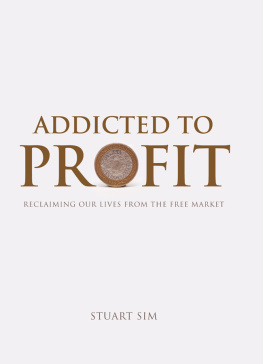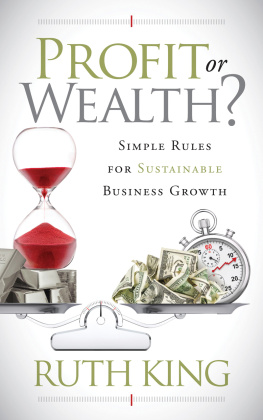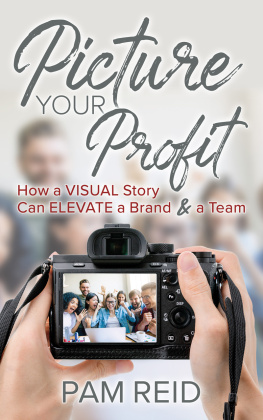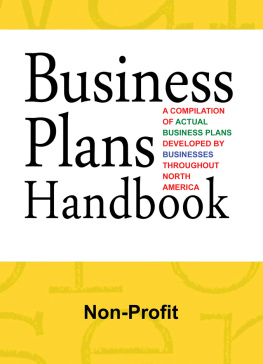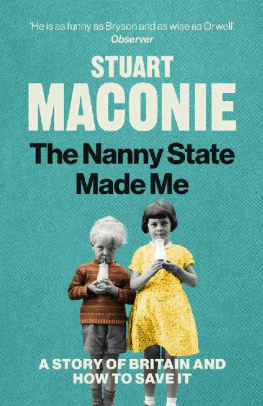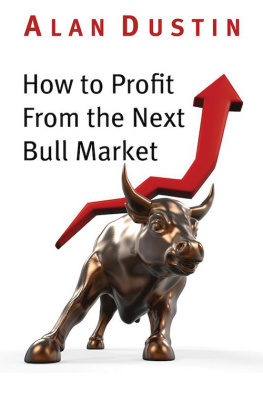Addicted to Profit
Addicted to Profit
Reclaiming Our Lives from the Free Market
STUART SIM
EDINBURGH
University Press
Stuart Sim, 2012
Edinburgh University Press Ltd
22 George Square, Edinburgh
www.euppublishing.com
Typeset in 10.5/13 Palatino
by Servis Filmsetting Ltd, Stockport, Cheshire,
and printed and bound in Great Britain by
CPI Group (UK) Ltd, Croydon, CR0 4YY
A CIP record for this book is available from the British Library
ISBN 978 0 7486 4671 5 (hardback)
ISBN 978 0 7486 4672 2 (webready PDF)
ISBN 978 0 7486 5459 8 (epub)
ISBN 978 0 7486 5458 1 (Amazon ebook)
The right of Stuart Sim
to be identified as author of this work
has been asserted in accordance with
the Copyright, Designs and Patents Act 1988.
Contents
Acknowledgements
Once again my thanks go to everyone at Edinburgh University Press, and most particularly my editor Jackie Jones, for their unfailing support and encouragement over the course of this project. It has been a pleasure to work with the Press for so many years now. Professor W. R. Owens made many helpful suggestions about the manuscript which were gratefully taken up. Doctor Helene Brandon heard the arguments being worked out, and as usual offered sound advice, especially on the topic of health debates.
Introduction: Its All About Profit
I n the MacTaggart Lecture at the Edinburgh International Television Festival in 2009 the media tycoon James Murdoch delivered a devastating attack on the BBC, and by implication public services in general, arguing that [t]here is an inescapable conclusion that we must reach if we are to have a better society. The only reliable, durable, and perpetual guarantor of independence is profit.for corporations to see their sole objective as to profiteer on behalf of their shareholders. We might better call the society we live in a profitocracy than a democracy; one ruthlessly dedicated to the production of profit at the expense of the public good, and to the cult of corporate profiteering.
The dismissive tone Murdoch adopts towards public service can only be depressing to anyone who thinks there is more to life than its economic aspect, and in its vision of society as primarily a means for generating profit for homo economicus: that we cannot really trust anyone, or any institution, that is not concerned to make a profit out of their activities in the public sector no less than the private. Yet tacitly or otherwise we go along with this notion in our everyday affairs, where the profit motive now dominates in so many areas, even in those in which its impact is at best highly suspect, perhaps even counterproductive: healthcare and education, for example, neither of which would seem to be all that well suited to the application of such a regimen. Neither is it healthy to treat the arts as an area which can only justify its activities if it generates financial profit, as if that were to be considered the only reliable, durable, and perpetual guarantor of aesthetic value too. The aim of this book is to challenge the underlying ideology involved and its reductive view of human existence that leads us to this cultural impasse, by questioning its basic principles: is profit the reason people fall in love, have families, create art, found religions, develop their talents and abilities, vote, show compassion towards others, try to build a socially more just society? Must we live perpetually under the tyranny of profit, with its narrow-minded assumption that economic self-interest lies at the core of our being, or can a case be made for the encouragement of an anti-profit mentality that actively resists its encroachment in the name of asserting our humanity? Ultimately, I am arguing for a paradigm shift, away from our obsession with profit to a world far more concerned with social justice than the one we are living in at present seems to be.
Profit has been fetishised by our culture to the extent that views like Murdochs can attract little adverse notice; a culture where Prime Minister David Cameron can find it quite unexceptional Neoliberals cannot bring themselves to give up their commitment to this, no matter what evidence may accumulate of its detrimental effect on human relations and our general quality of life.
I will be arguing against that ideologically driven project and suggesting that we can develop an anti-profit mentality to offset its baleful effect: that we are capable of being more than a self-interested homo economicus with a one-dimensional view of existence focused on financial gain. The structure of this book, which is intended to be both a critical study and a manifesto for cultural change, is as follows: after establishing the nature and socio-cultural concludes by recommending that, in the short term, we shift our focus culturally from living for the sake of creating profit to living with it; then in the longer term, that we strive to create a society where the profit ideology is comprehensively de-fetishised and we can consider ourselves free from the shackles of neoliberal economics. There is both a reformist and a radical perspective to this: reformists will call for greater emphasis to be put on wealth distribution than wealth generation; radicals for a lifestyle in which other aspects of our nature are given precedence over the entrepreneurial, and society is geared towards helping us to develop these. The value of each position will be assessed, but the critical point is that as far as both are concerned, it neednt all be about profit.
Overall, the narrative arc of the book runs from articulating the problem and some projected solutions to it, through detailing profits negative effect on our lives and then on to considering how best to approach dealing with it tactically so that we can move towards anti-profit as a social ideal, rather than allowing the ideology of the likes of James Murdoch to be given free rein. Or to put it more Addicted to Profit delves yet more deeply into the driving force behind that system, to form a more comprehensive critique of our current cultural set-up. At one time profit was put forward as the route to a better life, the way to improve the conditions of human existence for all. Now, however, courtesy of the hegemony of neoliberalism, profit has been turned into the whole reason for our existence, as if this was the point of our evolution as a species, and that is just dehumanising. As far as the Murdoch doctrine is concerned, its all about profit: I want to contest that judgement.
The Tyranny of Profit: Confronting an Addiction and a Fetish
T he profit motive has been applied to more and more areas of our lives by our political classes, such that the business model has become the major criterion by which almost all public services are judged; judged, and then all too often found badly wanting by those same classes, and thus candidates for wholesale reconstruction. Privatisation is consistently held up as the solution to all our public service needs, and public utilities such as water and electricity are systematically being hived off from the public sector internationally. It would have to be said, however, that the latter exercise has led to very mixed results in terms of both efficiency and cost to the consumer. On this score, a recent auditing report has criticised the UK Border Patrol for concentrating on profit-making activities at the expense of its core duties.profound implications on our public life. Whether we could rely on mercenary armies the way we do on native-born ones is only one of a host of questions that comes to mind in this context, and it would have to be said that the notion of killing others for personal profit is particularly abhorrent.

